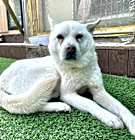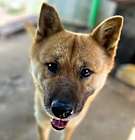Finnish Spitzes are medium-sized dogs, most weighing 23 to 48 pounds and standing between 15 and 20 inches tall. Males tend to be larger than females.
Finnish Spitz
Breed Type: Non-Sporting
Common nicknames: Finkie, Finsk Spets, Finnish Hunting Dog
Coat: Double
Hypoallergenic: No, they will likely trigger allergies.
Temperament: Affectionate, playful, adaptable, intelligent
Life expectancy: 13-15 years
Color & patterns: Red

The Finnish Spitz is a charming medium-sized breed with a vibrant red coat and fox-like appearance. With their cheerful and alert natures, they make excellent family companions and watchdogs. They are known for their distinctive barks, which makes them great at alerting their owners to potential threats, and are often referred to as the “barking bird-dog.” These pups do best when they receive plenty of mental and physical stimulation through activities like hiking, jogging, and participating in dog sports. The Finnish Spitz is the perfect choice for those seeking a spirited, active companion.
Finnish Spitz characteristics
Learn about about Finnish Spitz basics like their fur colors, shedding levels, how much grooming they need, and other Finnish Spitz facts.
Average height
15-20 inches (38.1-50.8cm)
Average weight
23-48 pounds (10.4-21.8 kg)
Average lifespan
13-15 years
Exercise needs
Grooming needs
Full-grown size
Good with cats
Good with kids
Training aptitude
When do Finnish Spitz stop growing?
Finnish Spitzes stop growing around 12 to 18 months of age. Even after they’ve reached their full height, some dogs will continue to fill out and gain muscle mass until about two years of age. Regular exercise and proper nutrition are important to ensure healthy development during this early growth period.
What colors do Finnish Spitzes come in?
The Finnish Spitz is a golden red color, though they are often born dark gray or black. Their coats range in color from a light, creamy buff to a rich, dark red.
How much do Finnish Spitzes shed?
Finnish Spitzes are moderate to heavy shedders. They have a double coat: a dense, soft undercoat and a longer outer coat. To keep their thick coats healthy, the Finnish Spitz needs regular brushing, but they’re a low-maintenance breed in terms of grooming.
Finnish Spitz temperament
Learn about about the Finnish Spitz temperament and how well they fit into your lifestyle, home environment, and family.
Are Finnish Spitzes good with kids?
Yes, Finnish Spitzes are good with kids. They tend to make eager playmates who are patient with spontaneous behavior and enjoy interactive play.
As with any breed, always supervise interactions between children and Finnish Spitzes to keep everyone safe. Teaching children how to properly approach and handle dogs is crucial to ensure positive experiences for both the dog and the child, as is teaching dogs how to interact gently with children.
Are Finnish Spitzes good with cats?
No, Finnish Spitzes aren’t always good with cats as they have a strong prey drive due to their hunting background and have an instinct to chase small, furry things — including the family feline. If they are introduced properly and socialized from a young age, however, chances are good your cat and a Finnish Spitz can get along just fine.
Are Finnish Spitz good with other dogs?
Finnish Spitzes are good with other dogs, provided they are properly socialized from a young age. In general, their friendly and playful nature leads to positive interactions with other dogs, but this breed’s strong prey drive can sometimes influence their behavior around smaller or more active dogs. Additionally, each Finnish Spitz has its own personality; many are sociable and enjoy the company of other dogs, while others are more reserved or dominant. Observe your Finnish Spitz’s interactions with other dogs to help ensure harmonious and happy relationships.
Do Finnish Spitzes bark?
Yes, Finnish Spitzes bark. This is a breed revered for their vocalization, stretching back to their history as hunting dogs when they barked to alert hunters to game they found. Their vocal ability has not diminished with their modern role as a companion dog. The Finnish Spitz is expressive, barking to get attention, alert their families to visitors, or simply to communicate their excitement or needs. As with any dog, however, they can be discouraged from barking as frequently with proper training and exercise.
Are Finnish Spitzes easy to train?
Finnish Spitzes are moderately easy to train. These smart dogs have an independent spirit and will respond well to consistency, patience, positive reinforcement, and lots of mental stimulation. Engaging them with various activities, puzzles, and games can help keep their interest during training. Keep in mind that training any dog takes substantial time and effort, regardless of breed.
Are Finnish Spitz intelligent?
Yes, Finnish Spitzes are intelligent. They are quick learners and can pick up commands and tasks easily. Their intelligence and energetic and alert nature make them responsive to training and eager to engage in new activities.
Are Finnish Spitz friendly?
Yes, Finnish Spitzes are friendly. These dogs tend to be warm and affectionate, sociable and playful. They can be outgoing and eager to interact with both familiar faces and new acquaintances.
Are Finnish Spitz good for first-time pet parents?
The Finnish Spitz is good for a first-time pet parent prepared to meet their grooming, training, and exercise needs. For those ready to regularly brush their Finnish Spitz, train them with patience and plenty of positive reinforcement, and provide regular mental and physical stimulation, their warm and frisky nature makes a rewarding companion for a first-time pet parent.
Are Finnish Spitz good apartment dogs?
Yes, Finnish Spitzes are good apartment dogs. This medium-sized dog is suitable for the scale of apartment living, provided their exercise and mental stimulation needs are met. Interactive toys, puzzles, playtime, and daily walks will help a Finnish Spitz be happy in an apartment.
Are Finnish Spitzes good family dogs?
Yes, Finnish Spitzes make great family dogs. Affectionate, playful, and adaptable, the Finnish Spitz can adjust well to various living situations, whether in a house with a yard or an apartment, as long as they get enough exercise. Their friendly, sociable natures make them good companions for children — however, as with any breed, it is recommended that children are always supervised when interacting with dogs to keep both safe. Teaching children how to properly approach and handle dogs is crucial to ensure positive experiences for both the dog and the child, as is teaching dogs how to interact gently with children.
Overall, this loving, energetic companion will make a welcome addition to your family.
Finnish Spitz history
Learn about where this Finnish Spitz came from!
Where are Finnish Spitzes from?
The Finnish Spitz is from Finland. The national dog of Finland, the Finnish Spitz, is an ancient breed used by indigenous people to hunt small game like squirrels and birds. Historical records and archaeological finds suggest the Finnish Spitz has been a part of Finnish culture for centuries, with its development closely tied to the region's history and traditions.
How long do Finnish Spitz live?
Finnish Spitzes live 13 to 15 years on average. Individual lifespans vary based on factors such as genetics, diet, exercise, and overall health care. Regular vet check-ups and a healthy lifestyle can help ensure your Finnish Spitz lives a long and healthy life.
Finnish Spitz health
Learn about about the Finnish Spitz health outlook and what diseases they may be prone to at various stages of their life.
Are Finnish Spitz hypoallergenic?
No, the Finnish Spitz is not hypoallergenic. They have a double coat that sheds and contributes to allergens in the home. Their longer outer coat can trap dander, while the undercoat is dense and sheds regularly.
Do Finnish Spitz have health issues?
Finnish Spitzes are, by and large, a very healthy breed with few genetic disorders, but they may experience common health issues, including:
Hip and/or elbow dysplasia: Hip and elbow dysplasia are two of the most common skeletal diseases seen in dogs. They are similar diseases in which either the hip or elbow joint has grown abnormally or is misshapen. The abnormal shape prevents the joints and sockets from adequately meeting one another, resulting in rubbing and grinding instead of sliding smoothly. Though the main complication with hip dysplasia is joint instability, the abnormalities present in elbow dysplasia often result in pieces of bone and/or cartilage breaking loose and irritating the joint tissues. Over time, the rubbing from dysplasia can cause a variety of issues, such as pain, lameness, and secondary osteoarthritis. Surgery can fix the joint if diagnosed before the onset of arthritis. If you are rescuing a Finnish Spitz, have them checked out by a vet to see if they are prone to dysplasia.
Patellar luxation: Also known as slipped kneecaps, patellar luxation is a common problem in many dog breeds. It occurs when slight abnormalities cause the knee joint to slide in and out of place. This can cause pain and occasional lameness. Surgical treatment is available for severe cases, although many dogs lead normal lives without treatment.
Diabetes: This breed has an above-average propensity towards diabetes, a complex disease that prevents the body from properly regulating blood sugar levels.
Epilepsy: Finnish Spitzes are also prone to this seizure disorder.
To identify some of these issues, a veterinarian may recommend hip, joint, and blood tests for your dog.
How much exercise do Finnish Spitz need?
The Finnish Spitz needs 60 to 90 minutes of physical activity per day, which can be broken up into multiple walks and play sessions. This breed thrives on variety in their exercise routine, so mix up their walks with more vigorous activities and explore new dog parks and neighborhoods to keep them interested and engaged.
Popular Finnish Spitz mixes
Some common Finnish Spitz mixes include:
Finnish Spitz Collie (Finnish Spitz + Collie)
Finnish Spitz Husky (Finnish Spitz + Siberian Husky)
Finnish Lab (Finnish Spitz + Labrador Retriever)
Finnish Spitz Shepherd (Finnish Spitz + German Shepherd
Finnish Spitz Pomeranian (Finnish Spitz + Pomeranian)
Finnish Spitz Beagle (Finnish Spitz + Beagle)

Find Finnish Spitz puppies near you
Adopting a Finnish Spitz
We don't see any Finnish Spitzes available for adoption in your exact location or cities near you, but here are some adorable similar breeds in Beverly Hills, CA.

Ellen
Icelandic Sheepdog Pomeranian
Female, 7 yrs 2 mos
West Hollywood, CA
Not good with dogs
Not good with cats
Spayed or Neutered

Cady
Jindo Retriever (Unknown Type)
Female, 2 yrs
Los Angeles, CA
Good with dogs
Not good with cats
Spayed or Neutered
Shots are up-to-date

Bianca
Jindo Retriever (Unknown Type)
Female, 2 yrs 1 mo
Los Angeles, CA
Good with dogs
Not good with cats
Spayed or Neutered
Shots are up-to-date

Otis
Jindo Jindo
Male, 5 yrs 7 mos
Los Angeles, CA
Good with dogs
Not good with cats
Spayed or Neutered
Shots are up-to-date

Teddy
Jindo Spitz (Unknown Type, Medium)
Male, 5 yrs 2 mos
Los Angeles, CA
Good with dogs
Not good with cats
Spayed or Neutered
Shots are up-to-date

Hotaru IN LA!!
Jindo Shiba Inu
Female, 5 yrs 6 mos
Los Angeles, CA
Good with dogs
Not good with cats
House-trained
Spayed or Neutered
Shots are up-to-date

Thunder
Jindo German Shepherd Dog
Male, 6 yrs 10 mos
Los Angeles, CA
Good with dogs
Not good with cats
Spayed or Neutered
Shots are up-to-date

Duke
Jindo Jindo
Male, 7 yrs 8 mos
Los Angeles, CA
Good with dogs
Not good with cats
Spayed or Neutered
Shots are up-to-date

Ellen
Icelandic Sheepdog Pomeranian
Female, 7 yrs 2 mos
West Hollywood, CA
Not good with dogs
Not good with cats
Spayed or Neutered

Cady
Jindo Retriever (Unknown Type)
Female, 2 yrs
Los Angeles, CA
Good with dogs
Not good with cats
Spayed or Neutered
Shots are up-to-date

Bianca
Jindo Retriever (Unknown Type)
Female, 2 yrs 1 mo
Los Angeles, CA
Good with dogs
Not good with cats
Spayed or Neutered
Shots are up-to-date

Otis
Jindo Jindo
Male, 5 yrs 7 mos
Los Angeles, CA
Good with dogs
Not good with cats
Spayed or Neutered
Shots are up-to-date

Teddy
Jindo Spitz (Unknown Type, Medium)
Male, 5 yrs 2 mos
Los Angeles, CA
Good with dogs
Not good with cats
Spayed or Neutered
Shots are up-to-date

Hotaru IN LA!!
Jindo Shiba Inu
Female, 5 yrs 6 mos
Los Angeles, CA
Good with dogs
Not good with cats
House-trained
Spayed or Neutered
Shots are up-to-date









